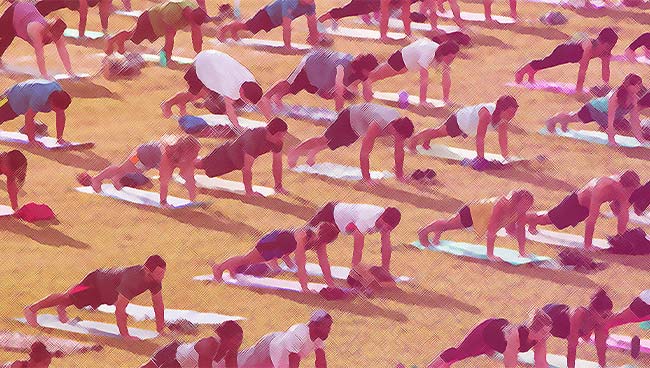There is no longer a routine path to purchase, so retailers and brands are breaking their own molds. Among the trends: Many are turning to fitness and hospitality in the latest bid to shape-shift into what shoppers want their stores to be.
We’ve reported before that shoppers are increasingly ditching their shopping routines. The latest piece of evidence is a literal sign of where trips may be heading: Do not disturb.
Call it amenity retail: Many merchants, as they follow the shopper’s unplanned path to purchase, are stepping into the hospitality and fitness businesses:
- Major brands including Amazon are merchandising and selling their services within hotels – or opening their own.
- Boutique fitness centers are providing and selling popular brands such as Kiehl’s and Lululemon.
- And major department stores are installing wellness centers in the middle of their fashion aisles.
The extension into wellness and hospitality is so practical one might ask: Why not sooner? Nearly half of shoppers (46%) have told us they exercise or do yoga to maintain good health. Hotel occupancies, meanwhile, rose to a record 70% in the second quarter of 2017, according to STR, a provider of hospitality data, and revenue per room increased to nearly $89, up 3% from a year ago.
Working Out Routines
In response, more retailers are inserting themselves into the shopper’s other daily routines, and to where they are flocking. Smart move, since shoppers have told us they no longer adhere to old shopping habits. Here’s what else shoppers told us:
- 37% have changed how they shop in the past few years
- 40% changed their shopping routines for health care products; 45% for beauty
- More than half (52%) said spa and salon services are no longer part of a routine
Engaging from Check-in to Checkout
Without a routine to track, more retailers are re-examining the priorities that satisfy their shoppers and engage them. For many, that means crossing paths in places where the shopper is doing what she loves. Here are a few good examples:
- King-sizing retail: Muji, a Japanese maker of minimalist home goods, is building a four-story hotel that will feature its furniture and accessories. Most clever – the store will operate on top of a new Muji store. Meanwhile, Amazon’s digital assistant, Alexa, is being tested at Marriott International’s Aloft brand in Boston and at the Wynn Las Vegas resort. And contemporary home furnishings chain West Elm plans to open seven branded hotels, each of which can display its wares.
- Cross-training brands: The luxury fitness chain Equinox is stocking Kiehl’s shampoos, cleansers, and lotions in its locker rooms and selling a broader range of Kiehl’s products, alongside items by Lululemon, MZ Wallace and Spiritual Gangster, at its shops. (Equinox also plans to open its first hotel, in New York, in 2019). The international fitness studio Exhale offers beauty elixirs by Pestle & Mortar as well as private-label apparel. It was recently acquired by Hyatt Hotels & Resorts.
- Getting physical in the showroom: Department stores at the same time are bringing wellness to their floors. Nordstrom in the spring installed GOOP pop-in shops at several locations. The wellness concept featured GOOP-labeled skincare, beauty products, and supplements plus offerings from Organic Pharmacy, Juice and Jao Brand. In Manhattan, Saks Fifth Avenue dedicates a full floor of its flagship to a multi-branded wellness concept, the Saks Wellery, which includes workout apparel, manicures and skin and body therapies.
These efforts prove that when the shopper pivots, brands can be fleet and flexible. It also means the retailer’s routine of reinforcing engagement is alive and kicking. A brand does not have to open a hotel or join a fitness boutique; it’s simply a matter of identifying where its ideal shoppers spend their happy time and getting in there – fast. There’s little time to sleep on it.


